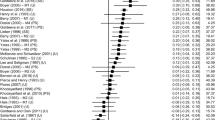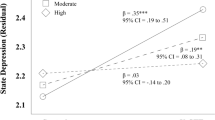Abstract
This prospective study tested three hypotheses put forth to explain previous inconsistencies in research examining the hopelessness theory of depression. Ninety-three university students completed measures of attributional style for achievement and interpersonal events both before and after experiencing a negative prime. Depressed mood was assessed before the priming task, and at two time points after the students completed their most difficult midterm exam: immediately after receiving their exam grade and 4 days later. Both exam outcome and attributional style, but not their interaction, were significant predictors of change in depressed mood immediately following the receipt of exam grades. Primed depressogenic attributional styles for achievement events interacted with a negative exam outcome to predict depressive mood reactions 4 days later.
Similar content being viewed by others
REFERENCES
Abela, J. R. Z. (2002). Depressive mood reactions to failure in the achievement domain: A test of the integration of the hopelessness and self-esteem theories of depression. Cognitive Therapy and Research, 26, 531-552.
Abela, J. R. Z., Brozina, K., & Seligman, M. E. P. (in press). A test of the integration of the activation hypothesis and the diathesis-stress component of the hopelessness theory of depression. British Journal of Clinical Psychology.
Abela, J. R. Z., & Seligman, M. E. P. (2000). The hopelessness theory of depression: A test of the diathesis-stress component in the interpersonal and achievement domains. Cognitive Therapy and Research, 24, 361-378.
Abramson, L. Y., Alloy, L. B., & Metalsky, G. I. (1995). Hopelessness depression. In G. M. Buchanan & M. E. P. Seligman (Eds.), Explanatory style (113-134). Hillsdale, NJ: Erlbaum.
Abramson, L. Y., Metalsky, G. I., & Alloy, L. B. (1989). Hopelessness depression: A theory based subtype of depression. Psychological Review, 96, 358-372.
Alloy, L. B., Abramson, L. Y., Hogan, M. E., Whitehouse, W. G., Rose, D. T., Robinson, M. S., et al. (2000). The Temple-Wisconsin Vulnerability to Depression Project: Lifetime history of axis I psychopathology in individuals at high and low cognitive risk for depression. Journal of Abnormal Psychology, 109, 403-418.
Alloy, L. B., & Clements, C. M. (1998). Hopelessness theory of depression: Tests of the symptom component. Cognitive Therapy and Research, 22, 303-335.
Alloy, L. B., Just, N., & Panzarella, C. (1997). Attributional style, daily life events, and hopelessness depression: Subtype validation by prospective variability and specificity of symptoms. Cognitive Therapy and Research, 21, 221-244.
Beck, A. T. (1983). Cognitive therapy of depression: New perspectives. In P. J. Clayton & J. E. Barrett (Eds.), Treatment of depression: Old controversies and new approaches (pp. 265-290). New York: Raven Press.
Blatt, S. J., & Zuroff, D. C. (1992). Interpersonal relatedness and self-definition: Two prototypes of depression. Clinical Psychology Review, 12, 527-562.
Cohen, J., & Cohen, P. (1983). Applied multiple regression/correlation analysis for the behavioral sciences (2nd ed). Hillsdale, NJ: Erlbaum.
Follette, V. M., & Jacobson, N. S. (1987). Importance of attributions as a predictor of how people cope with failure. Journal of Personality and Social Psychology, 52, 1205-1211.
Hunsley, J. (1989). Vulnerability to depressed mood: An examination of the temporal consistency of the reformulated learned helplessness model. Cognitive Therapy and Research, 13, 599-608.
Metalsky, G. I., Halberstadt, L. J., & Abramson, L. Y. (1987). Vulnerability to depressive mood reactions: Toward a more powerful test of the diathesis-stress and causal mediation components of the reformulated theory of depression. Journal of Personality and Social Psychology, 52, 386-393.
Metalsky, G. I., & Joiner, T. E., Jr. (1992). Vulnerability to depressive symptomatology: A prospective test of the diathesis-stress and causal mediation components of the hopelessness theory of depression. Journal of Personality and Social Psychology, 63, 667-675.
Metalsky, G. I., & Joiner, T. E., Jr. (1997). The Hopelessness Depression Symptom Questionnaire. Cognitive Therapy and Research, 21, 359-384.
Metalksy, G. I., Joiner, T. E., Jr., Hardin, T. S., & Abramson, L. Y. (1993). Depressive reactions to failure in a naturalistic setting: A test of the hopelessness and self-esteem theories of depression. Journal of Abnormal Psychology, 102, 101-109.
Needles, D. J., & Abramson, L. Y. (1990). Positive life events, attributional style, and hopefulness: Testing a model of recovery from depression. Journal of Abnormal Psychology, 99, 156-165.
Persons, J. B., & Miranda, J. (1992). Cognitive theories of vulnerability to depression: Reconciling negative evidence. Cognitive Therapy and Research, 16, 485-502.
Peterson, C. R., Semmel, A., von Baeyer, C., Abramson, L. Y., Metalsky, G. I., and Seligman, M. E. P. (1982). The Attributional Style Questionnaire. Cognitive Therapy and Research, 6, 287-299.
Peterson, C., & Villanova, P. (1988). An Expanded Attributional Style Questionnaire. Journal of Abnormal Psychology, 97, 87-89.
Ralph J. A., & Mineka, S. (1998). Attributional style and self-esteem: The prediction of emotional distress following a midterm exam. Journal of Abnormal Psychology, 107, 203-215.
Swensen, J. D. (1997). Anxiety, depression, and their comorbidity: An experience sampling test of the hopelessness theory. Cognitive Therapy and Research, 21, 97-114.
Wechsler, D. (1981). Manual for the Wechsler Adult Intelligence Scale-Revised. San Antonio, TX: The Psychological Corporation.
Weiner, B. (1986). An attributional theory of motivation and emotion. New York: Springer-Verlag.
Zuckerman, M., & Lubin, B. (1965). Manual for the Multiple Affect Adjective CheckList. San Diego, CA: Educational and Industrial Testing Service.
Author information
Authors and Affiliations
Corresponding author
Rights and permissions
About this article
Cite this article
Abela, J.R.Z., Brozina, K. The Use of Negative Events to Prime Cognitive Vulnerability to Depression. Cognitive Therapy and Research 28, 209–227 (2004). https://doi.org/10.1023/B:COTR.0000021541.94461.7c
Issue Date:
DOI: https://doi.org/10.1023/B:COTR.0000021541.94461.7c




